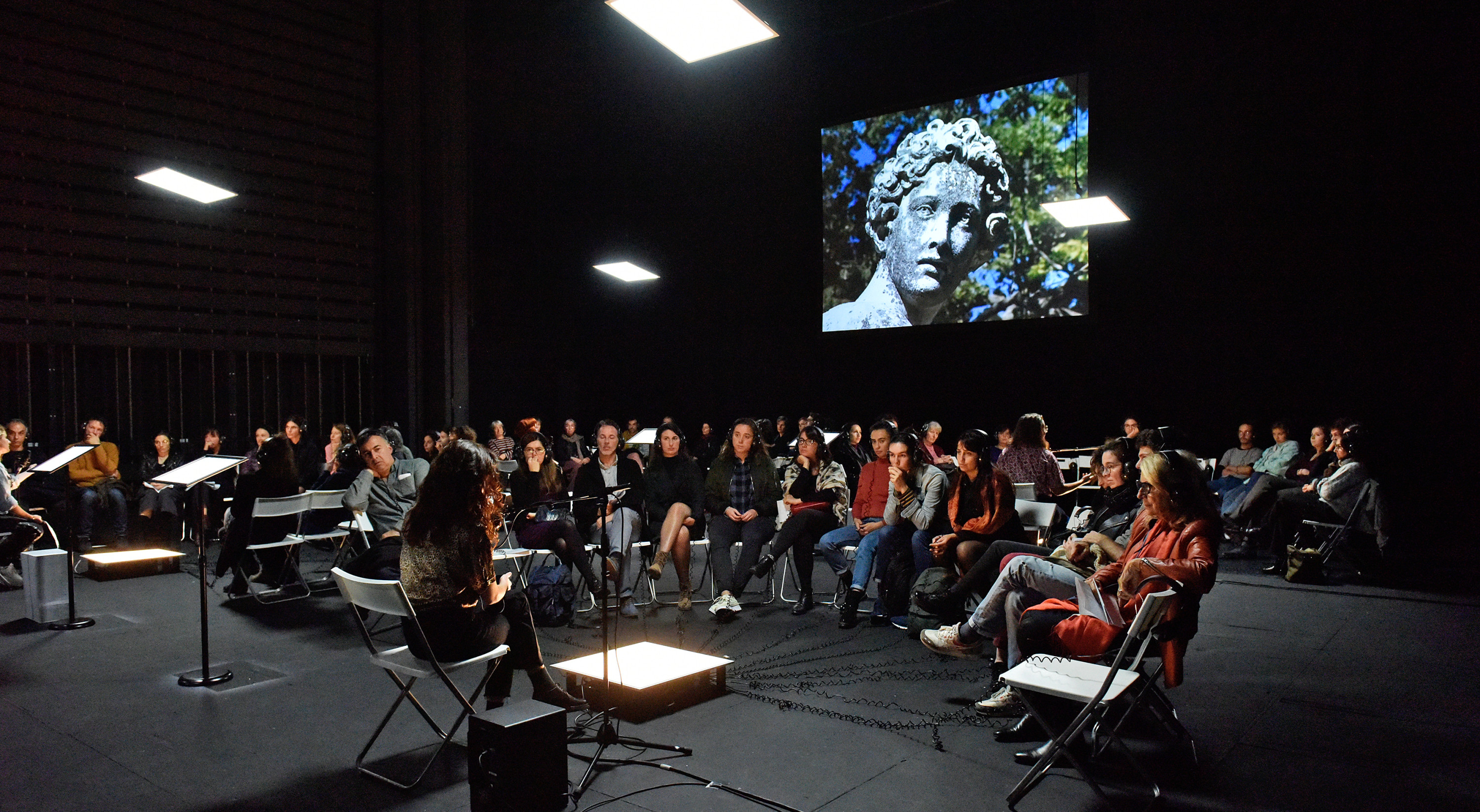Émilie Rousset, Maya Boquet
Reconstitution : Le procès de Bobigny
octoberoct 30 - november – nov 30
Conceived and written by Emilie Rousset, Maya Boquet. Directed by Emilie Rousset. Play for fifteen performers with (alternating since the creation) Véronique Alain, Renaud Bertin, Aymen Bouchou, Hélène Bressiant, Antonia Buresi, Barbara Chanut, Rodolphe Congé, Suzanne Dubois, Stéphanie Farison, Thomas Gonzalez, Anaïs Gournay, Nan Yadji Ka-Gara, Emmanuelle Lafon, Anne Lenglet, Mélanie Martinez Llense, Olivier Normand, Aurélia Petit, Gianfranco Poddighe, Lamya Régragui, Ghita Serraj, Anne Steffens, Nanténé Traoré, Kevin Tussidor, Manuel Vallade, Margot Viala, Jean-Luc Vincent. Video Louise Hémon. Lighting design Laïs Foulc. Sound design Romain Vuillet. Dramaturgy Maya Boquet. Video editing Carole Borne. Sound and Video manager Romain Vuillet alternating with Cristián Sotomayor. Lighting and stage management Jérémie Sananes, Ludovic Rivière. Assistant director Elina Martinez. Production, administration Les Indépendances – Colin Pitrat, Hélène Moulin.
Production John Corporation
Coproduction T2G Théâtre de Gennevilliers, Centre Dramatique National ; Festival d’Automne à Paris ; Groupe des 20 Théâtres en Île-de-France ; Le POC Scène artistique d’Alfortville
Project funded by the Île-de-France Region with the support of the Ministry of Culture
With the participation of DICRéAM
With the support of the Fonds d’Insertion pour Jeunes Comédiens de l’ESAD – PSBB and of the Spedidam
John Corporation is subdivised by the Drac Île-de-France – ministère de la Culture and by the Île-de-France Region
Émilie Rousset is an associate artist of Points communs – Nouvelle scène nationale de Cergy – Pontoise et du Val d’Oise ; Lieu unique – Scène nationale de Nantes and Volcan – Scène nationale du Havre
Revival supported by the Drac Île-de-France
Ritual 5: Death at work
Read more on Mouvement
Theatre workshop
Tuesday 29 October 2024 from 6.30pm to 9.30pm, a workshop devoted to the technique of ‘playing with an earpiece’ through the show's archives.
Attendance at the workshop entitles you to a seat for the show on the date of your choice from among the 4 performances. Make your reservation here!
Abortion rights encounter
Wednesday 30 October 2024 at 6pm, before the performance. Free admission.
In a highly original manner, Émilie Rousset and Maya Boquet bring to the stage testimonies and archives arising from a crucial event in the advancement of women's rights. Navigating a path between the fifteen performers, each spectator builds his or her own mental journey in relation to the subject and its ramifications in today's world, but also in terms of the very process of representation itself.
In Reconstitution : Le procès de Bobigny, Émilie Rousset and Maya Boquet focus on a historical event : the trial, held on the 8th November 1972, of Marie-Claire Chevalier and her mother, in response to the young girl’s abortion after being raped. This trial, a critical moment in the advancement of women’s rights, was led by the renowned lawyer Gisèle Halimi. It crystallised the feminist reflections and combats of the time, and was nourished by contributions from Simone de Beauvoir, Nobel prize-winning doctors, the actress Delphine Seyrig and the politician Michel Rocard. Using the transcription of the trial as their starting point, and adding to it with testimonials of a contemporary nature, Émilie Rousset and Maya Boquet pose questions about the resonances in today’s world of the themes evoked and also the status of the archive itself. The highly original staging used in Reconstruction has the effect of deconstructing the theatrical aspect of the trial. Navigating between the fifteen performers and the testimonies addressed directly to the audience, each of us is invited to choose and follow his or her own train of thought and comprehension. In the interstices between the testimonies, a space is given over to reflection and exchange. By giving audience members the opportunity of putting into perspective the different events, the pieces probes into the very notion of reconstitution and the gap or disparity that exists between an event, the documents produced and their representation.
See also
